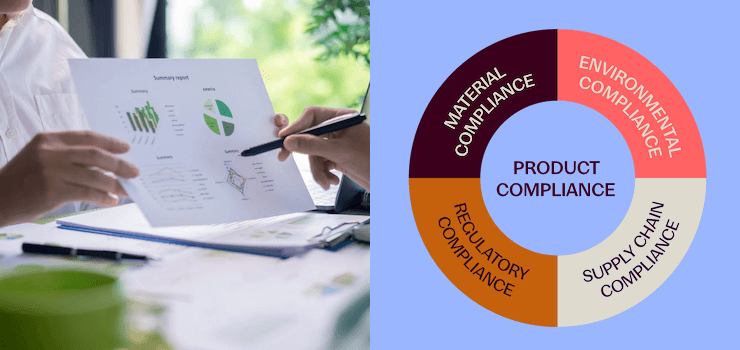The Digital Product Passport (DPP) is one of the European Union’s most ambitious initiatives to promote transparency, traceability, and sustainable product design. It will soon become mandatory across multiple industries, requiring companies to rethink how they manage product data across the entire lifecycle.
Starting with batteries under the EU Battery Regulation and the concept of the Battery Passport, the DPP framework will expand to textiles, electronics, construction materials, and more. For manufacturers, suppliers, and retailers, this shift is both a compliance challenge and an opportunity to unlock new circular economy business models.
.png?width=3941&height=2340&name=EU_Battery_Regulation_NEW(1).png)
What is a Digital Product Passport?
A Digital Product Passport is a digital record that consolidates verified information about a product throughout its lifecycle. Instead of being scattered across disconnected systems, this data is linked to the product through a unique identifier—such as a QR code, NFC chip, or RFID tag—that can be scanned by stakeholders at any point in the supply chain.
The goal: to make product transparency the new standard in the European market.
Key information stored in a DPP may include:
- Basic product data – product name, model, batch, warranty, manufacturing date.
- Material and supply chain data – sourcing of raw materials, recycled content, suppliers involved.
- Repair and maintenance history – records of repairability, upgrades, or part replacements.
- Sustainability metrics – carbon footprint, recyclability, and environmental impact.
- Compliance information – certifications, hazardous substances, and conformity with EU regulations.
This data-driven approach will allow companies, regulators, and consumers alike to verify claims, extend product lifetimes, and support circular business models.
The Regulatory Framework: From ESPR to Circular Economy
The foundation of the Digital Product Passport lies in the Ecodesign for Sustainable Products Regulation (ESPR). Adopted in 2024, ESPR is a key part of the EU’s Circular Economy Action Plan (CEAP) and aims to make products placed on the EU market more durable, resource-efficient, and easier to recycle.
The DPP is the core mechanism that will ensure compliance with ESPR. By requiring machine-readable, standardized data for every regulated product, the EU is creating a framework for full product traceability across value chains.
While the Battery Passport is the first concrete application under the new EU Battery Regulation, delegated acts will gradually extend DPP requirements to other industries. For businesses, this means preparing now—not only for sector-specific obligations, but for the future of digital product transparency in the EU market.
Who Needs to Comply? Affected Industries and Companies
Although batteries are the first category with mandatory digital product passports, ESPR defines a broader scope that will expand in the coming years.
The first wave of industries expected to implement DPPs includes:
- Iron and steel
- Aluminum
- Textiles (especially garments and footwear)
- Furniture
- Tyres
- Detergents
- Paints
- Lubricants
- Chemicals
- Energy-related products subject to ecodesign requirements
- Information and communication technology (ICT) products and other electronics
For manufacturers, importers, distributors, and retailers, the implications are clear: if your products are sold in the European Union, you will need to provide a compliant DPP. The regulation also applies globally—companies outside the EU that place products on the European market are equally responsible for compliance.
Digital Product Passports: Pioneering the Sustainable Economy
.png?width=1812&height=425&name=dpp-circular-economy-goals(1).png)
Discover how Digital Product Passports are shaping transparency, compliance, and circularity. Learn why IPOINT experts see them as a key enabler for the circular economy and sustainable value chains — from batteries to automotive and beyond.
What Data Will Be Stored in the Digital Product Passport?
The European Commission is still finalizing detailed requirements, but based on ESPR and early delegated acts, companies should expect to include at least the following categories of information:
- Unique product identifier linked to a digital record.
- Product model details including technical specifications.
- Supply chain data covering material sourcing, recycled content, and suppliers.
- Repair, reuse, and recycling instructions to extend product lifetimes.
- Environmental performance such as carbon footprint, hazardous substances, and energy efficiency.
- Compliance details verifying conformity with EU standards.
Importantly, the system will use structured, machine-readable formats to ensure interoperability across industries. Controlled access will allow different stakeholders—from consumers to regulators—to view relevant information without compromising trade secrets.
Opportunities and Challenges of DPP Implementation
| Opportunities | Challenges |
|
|
|
Despite these hurdles, many companies view DPP adoption as a strategic investment rather than a regulatory burden.
How Companies Can Prepare for the Digital Product Passport
- Centralize Product Data
Consolidate fragmented product information into a single source of truth. Many organizations are investing in Product Information Management (PIM) or compliance platforms. - Collaborate with Suppliers
Engage your suppliers early to align on data requirements for materials, worker welfare, and environmental impact. - Conduct Data Audits
Identify gaps in your existing datasets, such as missing repairability information or incomplete carbon footprint calculations. - Invest in Technology
Explore technologies like blockchain, NFC, RFID, or QR codes to ensure traceability and secure data transfer. - Pilot DPP Projects
Start with one product category—often batteries, since they are first in line—and scale up from there. - Monitor Regulatory Updates
Stay informed about ESPR delegated acts and industry-specific guidelines. Continuous adaptation will be necessary as requirements evolve.
|
Conclusion: From Compliance to Opportunity
The Digital Product Passport EU initiative represents more than just another layer of regulation. By mandating transparent, reliable product data, it creates the foundation for a more sustainable, circular, and competitive economy.
For companies, this means moving beyond minimum compliance and embracing the DPP as a chance to:
- Build trust with customers.
- Drive value across supply chains.
- Unlock new circular business opportunities.
The first step begins now—with battery passports under the EU Battery Regulation—but the implications reach far beyond. By preparing today, businesses can position themselves not only for compliance but also as leaders in the sustainable markets of tomorrow.

With the IPOINT Digital Product Passport software solution, you can capture and manage sustainability, compliance, and ESG data in one trusted system, automate reporting, and increase transparency across your entire value chain. This not only ensures readiness for the EU Battery Regulation and upcoming ESPR requirements but also empowers your business to actively shape the digital circular economy.
Frequently Asked Questions
What is a Digital Product Passport (DPP)?
A Digital Product Passport (DPP) is a digital record that provides standardized, reliable information about a product’s composition, origin, lifecycle, and environmental impact. It is part of the EU’s Ecodesign for Sustainable Products Regulation (ESPR) and designed to promote transparency, compliance, and circular economy practices.
Which industries will be affected by the Digital Product Passport EU initiative?
The first sectors required to implement DPPs include batteries, textiles, electronics, iron and steel, aluminum, furniture, detergents, paints, lubricants, and chemicals. Over time, the Digital Product Passport will expand to nearly all regulated product groups sold in the European Union.
When will Digital Product Passports become mandatory?
The rollout starts in 2026 with industrial and electric vehicle batteries, followed by textiles and electronics in 2027. By 2030, DPPs are expected to cover additional industries, making them a standard requirement for most products in the EU market.
What information is stored in a Digital Product Passport?
A DPP typically contains product identifiers, material and supply chain data, sustainability metrics such as carbon footprint and recyclability, repair and reuse information, and compliance details with EU regulations. All data must be machine-readable, standardized, and accessible to relevant stakeholders.
Why are Digital Product Passports important for companies?
DPPs go beyond regulatory compliance. They create opportunities to build consumer trust, improve supply chain transparency, and enable circular business models such as repair, reuse, and recycling. Early adoption also helps companies prepare for upcoming EU regulations and strengthen their sustainability strategy.
How can companies prepare for DPP compliance?
Businesses should begin by centralizing product data, collaborating with suppliers, conducting data audits, and investing in digital technologies like QR codes, RFID, or blockchain. Solutions like the IPOINT Digital Product Passport software help automate data collection, ensure compliance with the EU Battery Regulation, and streamline ESG reporting.







